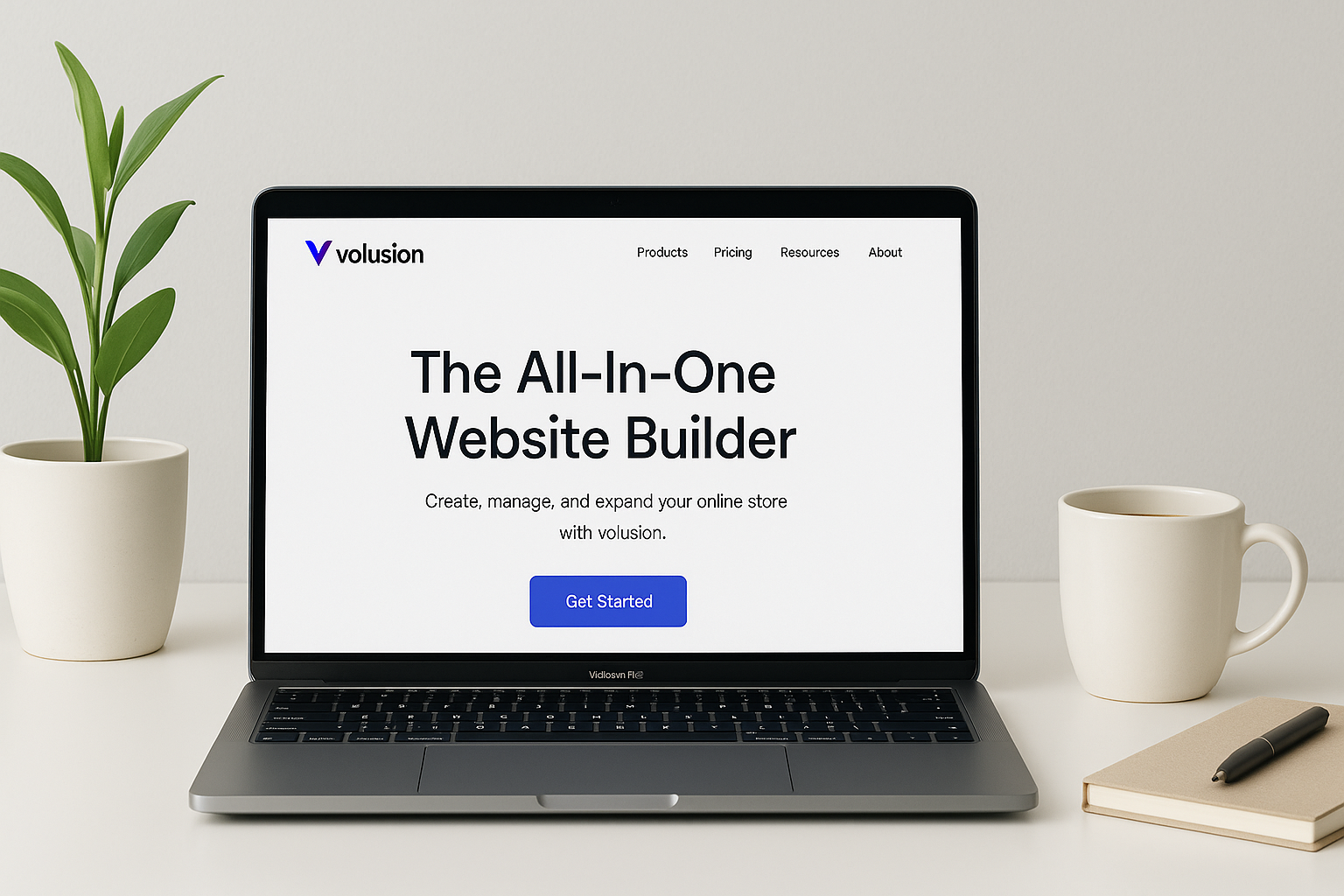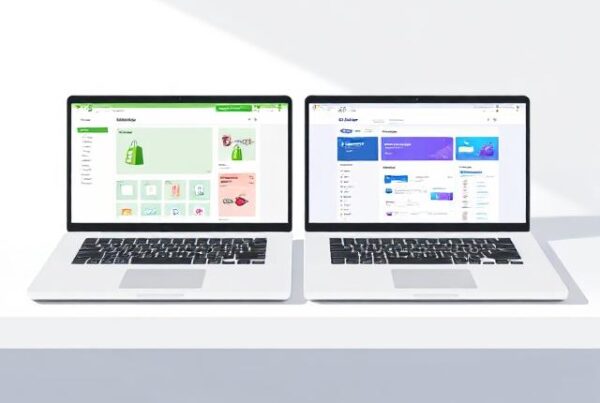Volusion review studies show a platform at a crossroads. According to PCMag, despite being one of the oldest eCommerce website builders on the market since 1999, Volusion has experienced a concerning 17% decrease in active stores year-over-year as of late 2024. While the platform has processed an impressive 185 million orders throughout its history, its bankruptcy filing in 2020 raises serious questions about long-term stability.
When examining Volusion’s e-commerce offerings, you’ll find four pricing tiers ranging from $35 to $299 monthly, plus a custom-priced Prime option. Although the Volusion website builder has recently been updated with features like premium checkout and an upgraded site designer, its value proposition remains questionable.
The volusion pricing structure imposes strict annual sales limits, $50,000 for the Personal plan and up to $500,000 for the Business plan, forcing you to upgrade as your store grows. Customer satisfaction ratings tell a concerning story, too, with an unimpressive score of 1.7 out of 5, suggesting that many users are looking elsewhere for their eCommerce solutions.
What Is Volusion and Who Is It For?
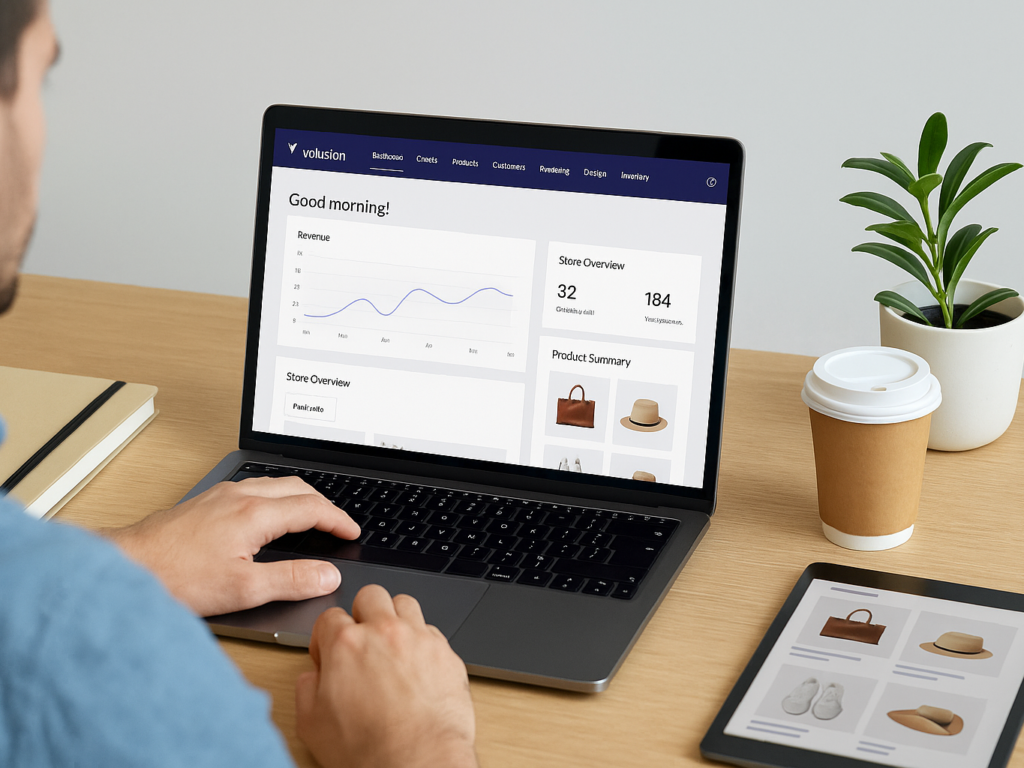
Established in 1999 by Kevin Sproles, Volusion began as a small web design agency in California before evolving into a comprehensive eCommerce platform. Highlighted by Avada, for over two decades, this all-in-one solution has empowered entrepreneurs to build and manage successful online stores, processing more than 185 million orders throughout its history.
1. Platform Overview and History
Volusion is a fully hosted eCommerce platform that provides the essential tools for creating, managing, and expanding online businesses. The company relocated its headquarters to Austin, Texas, which it now considers home. Throughout its journey, Volusion has served over 250,000 entrepreneurs worldwide. As highlighted by LitExtension’s Volusion review, recent data shows a concerning 17% decrease in active stores year-over-year.
After experiencing significant growth and raising $55 million in Series A funding in 2016, the company faced challenges that led to a bankruptcy filing in 2020. Subsequently, Volusion has worked to modernize its platform with innovations like VOLT, their new flexible, scalable eCommerce framework built on what they call Element.
Key features of the platform include:
- Inventory management with automatic stock monitoring
- Multiple payment gateway options
- Mobile-optimized store designs
- Marketing tools for coupons, rewards, and email campaigns
- PCI certification for enhanced security
2. Target Audience: Who Should Use Volusion?
Volusion primarily caters to small and medium-sized businesses looking to establish or enhance their online presence. The platform serves various industries, including apparel, beauty, jewelry, health, food and beverage, electronics, and automotive sectors.
You’ll find Volusion particularly suitable if:
- You’re a smaller merchant seeking an all-in-one solution without technical expertise
- Your Business needs comprehensive inventory management tools
- You want to avoid transaction fees (available with Volusion Payments)
- Your sales volume aligns with their annual revenue caps
According to the company’s information, its user-friendly interface appeals to organizations ranging from individual entrepreneurs to Fortune 500 companies. Nevertheless, the platform appears most valuable for businesses with moderate product catalogs that can operate within its annual sales limits.
3. Volusion vs. Other eCommerce Builders
Volusion stands out from major competitors like Shopify and BigCommerce through its unique features, such as not charging additional transaction fees when using its native payment processor. However, unlike Shopify and BigCommerce, which operate without such restrictions, Volusion does impose annual revenue limits on all plans.
While Volusion’s entry-level Personal plan is priced at $35 per month, slightly higher than Shopify’s $29 Basic plan, it also limits product inventory on lower-tier plans. Shopify is noted for its user-friendliness and a larger app marketplace. In contrast, BigCommerce excels in features for larger businesses, including multichannel selling capabilities.
Volusion Review: Volusion Pricing Plans and Revenue Limits
Examining Volusion’s pricing structure reveals a tiered system that scales with your business growth, albeit with some significant limitations. Each plan has specific product limits and annual sales caps that directly impact your store’s scalability.
| Plan | Pricing | Features |
| Personal Plan | $35/month | Up to 100 products, Annual sales limit: $50,000, 1 staff account, Basic support options |
| Professional Plan | $79/month | Up to 5,000 products, Annual sales limit: $100,000, 5 staff accounts, Enhanced support (phone support included) |
| Business Plan | $299/month | Unlimited products, Annual sales limit: $500,000, 15 staff accounts, API access, and advanced integrations |
| Prime Plan | Custom pricing | Tailored for enterprises, Dedicated Client Success Manager, Priority support, and early access to new features |
1. Personal plan: $35/month, 100 Products
According to PCMag’s Volusion eCommerce Review, the entry-level Personal plan costs $35 per month and targets solo entrepreneurs just starting their e-commerce journey. This basic package limits you to listing only 100 products and restricts you to a single staff account. Support options include live chat and email assistance only; no phone support exists. Perhaps most importantly, this plan caps your annual sales (what Volusion calls Gross Merchandise Volume or GMV) at $50,000. Once you exceed this threshold, Volusion will automatically upgrade your account.
2. Professional plan: $79/month, 5,000 Products
As noted by PCMag, stepping up to the Professional plan at $79 monthly significantly expands your capabilities. This mid-tier option increases your product limit to 5,000 items and allows five staff accounts. While offering the same support channels as the Personal plan, your annual sales limit expands to $100,000. Some sources indicate this cap might be higher at $400,000, but Volusion’s official pricing page confirms the $100K limit.
3. Business and Prime Plans: Unlimited Products
For established stores with larger inventories, the Business plan at $299 per month removes product limitations entirely. Additionally, this tier increases staff accounts to 15 and introduces phone support. The Business plan raises your annual sales ceiling to $400,000.
The Prime plan, priced through custom quotes based on your GMV, offers the ultimate flexibility with unlimited products, staff accounts, and VIP response priority. This tier completely removes annual sales restrictions and provides dedicated high-priority support.
4. Annual Sales Caps and Auto-Upgrades
One crucial aspect of the Volusion pricing model is the implementation of annual sales limits across all standard plans. Once your trailing 12-month sales exceed your plan’s GMV cap, Volusion automatically upgrades your account to the next tier. This auto-upgrade mechanism means your monthly costs will increase as your Business grows, sometimes significantly. For instance, if you exceed the Personal plan’s $50K limit, you’ll face an immediate jump to $79 monthly for the Professional plan.
5. Free Trial and Transaction Fees Explained
Volusion offers a 14-day free trial that requires no credit card to get started. It allows you to test the platform’s features without financial commitment. Regarding transaction fees, Volusion presents an interesting structure. Using their native payment processor, Volusion Payments (powered by Stripe), you’ll pay zero transaction fees regardless of your plan tier.
However, if you choose alternative payment gateways, Volusion imposes percentage-based transaction fees: 1.25% for Personal, 0.65% for Professional, 0.35% for Business, and custom rates for Prime plans. This fee structure incentivizes merchants to adopt Volusion’s payment solution rather than third-party processors.
Volusion’s pricing may initially seem competitive compared to competitors. Still, the combination of product limits, GMV caps, and potential auto upgrades means your total cost of ownership could increase unexpectedly as your Business grows.
Volusion Features: What You Get at Each Tier
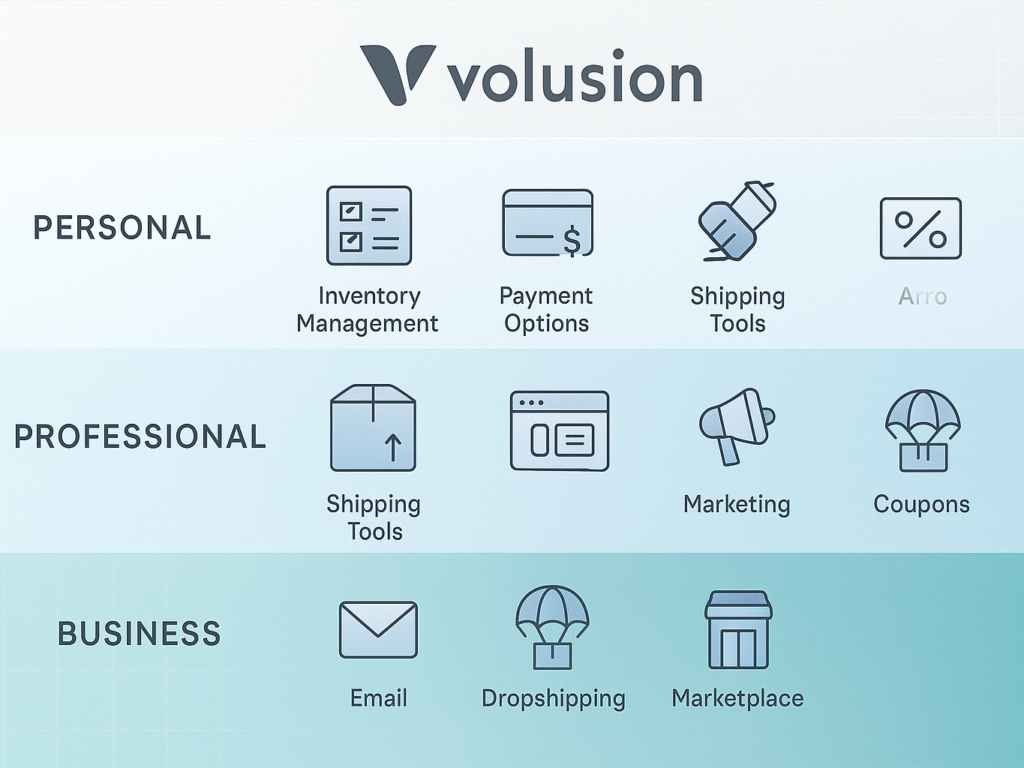
Beyond basic pricing tiers, Volusion features distribution across plans that determine the platform’s actual value for your Business. As you scale through Volusion’s offerings, you’ll notice significant differences in capabilities that directly impact your store’s operational efficiency.
1. Inventory Management and Suggested Products
Volusion’s inventory management system is the core of its e-commerce functionality and becomes more advanced as you upgrade your plan. It automatically tracks stock levels, shows real-time product status, and sends alerts when inventory is running low, helping you avoid stockouts and keep customers satisfied.
- Advanced warehouse management is available on higher-tier plans
- Multiple warehouse locations can be set up and managed
- Products are assigned to specific warehouses for accurate shipping calculations
- Automatic purchase order generation to streamline restocking
Additionally, the “Related Products” feature is available on all plans, allowing you to showcase complementary items. This helps boost your average order value by encouraging customers to add more products to their cart through effective cross-selling.
2. Payment Gateways and Volusion Payments
Volusion offers strong payment flexibility across all plan tiers, supporting a wide range of payment methods such as credit cards, Amazon Pay, PayPal, electronic checks, wire transfers, and money orders. This ensures customers can pay using their preferred option.
- Volusion Payments, powered by Stripe, is the preferred processor for US merchants.
- Instant, secure setup with global payment coverage and fraud protection
- Supports digital wallets like Apple Pay
- Eliminates gateway maintenance fees charged by other processors
As highlighted by PCMag’s Volusion review, PayPal integration adds value by enabling payments through PayPal, Venmo, PayPal Credit, and installment plans. Since 49% of users abandon carts when PayPal isn’t available, this feature helps reduce lost sales significantly.
3. Shipping Tools and Premium Checkout
The Premium Checkout feature represents one of Volusion’s most significant recent improvements. It is available across all plan tiers. This streamlined checkout process reduces friction with a clean, mobile-optimized design that has helped some merchants achieve a 50% increase in completed online orders versus phone orders.
Key Premium Checkout capabilities include address verification (which validates shipping addresses to prevent delivery issues), guest checkout options, location-specific error messaging, and fewer required clicks. The system also supports gift cards, custom fields for gathering additional information, and promotional code redemption.
Shipping tools vary by plan tier but generally include options to specify shipping types, require signatures, offer discounts, provide flat rate options, and set overall shipping rates. Higher plans unlock more sophisticated shipping capabilities.
4. Marketing Tools: Coupons, Rewards, and Email
Volusion’s marketing arsenal spans all plan tiers with varying levels of sophistication. The platform’s coupon and discount system allows you to create promotions with custom start times, durations, and values. You can generate specific coupon codes, set minimum/maximum order requirements, create one-time-use coupons, and implement quantity-based discounts.
The rewards program enables customers to earn points from purchases and redeem them for future orders, fostering loyalty and repeat business. You gain access to more advanced marketing capabilities as you move up tiers.
Email marketing functionality varies by plan, with higher tiers offering more sophisticated segmentation and automation. The newsletter system supports opt-in/opt-out capabilities, abandoned cart email marketing, and targeted campaign tracking with ROI reporting.
5. POS, Dropshipping, and Multichannel Sales
Volusion offers a Point of Sale (POS) system for merchants with a physical presence that integrates with your online store. This unified inventory approach ensures consistent stock levels across physical and digital sales channels.
Dropshipping capabilities are built into the platform, with automated order processing for your suppliers. This feature streamlines fulfillment for merchants who don’t maintain their inventory.
For multichannel sellers, Volusion supports integrations with major marketplaces through third-party connectors. Services like eChannelHub enable the synchronization of products, inventory, and orders across Amazon, Walmart, eBay, and other platforms. These tools provide real-time inventory updates to prevent overselling and centralised order management for more efficient fulfillment.
User Experience: Site Builder, Design, and Support
Navigating Volusion’s user interface reveals a mixed experience that balances innovative features with frustrating limitations. The platform’s design tools and support systems vary considerably depending on your subscription level.
1. Templates and Customization Options
According to PCMag, Volusion offers 24 store templates, which is modest compared to many competitors. All themes are professionally designed for online storefronts and are included at no extra cost. The system breaks your website into movable “blocks” for easy customization.
- Templates are pre-built by expert designers.
- Editing is intuitive with hover-to-edit highlights.
- Themes are fully responsive for mobile and tablet devices
- Merchants can rearrange blocks to customize the layout
Overall, Volusion’s template system provides a simple, user-friendly way to create a professional-looking store that adapts smoothly across devices.
2. Ease of Use: Dashboard and Editor
The Volusion dashboard deviates from industry norms by placing all options in a toolbar at the top of the screen instead of using left-hand navigation. This arrangement can initially disorient new users. Adding products through the Inventory tab is straightforward, with helpful question marks next to fields explaining their purpose.
Yet, content management suffers from unclear menu structures, often requiring users to hunt through multiple areas to make simple text changes. First-time users may find the abundance of options overwhelming, as even seasoned e-commerce professionals might need time to navigate SEO settings and discount management.
3. Mobile App and On-the-Go Management
The Volusion mobile app, available for Android and iOS devices (including Apple Watch), enables on-the-go store management. Key features include inventory monitoring, payment processing through integrated gateways, and low-stock alerts. As explained by MobiLoud, for merchants seeking enhanced mobile presence, third-party services can convert Volusion stores into dedicated mobile apps, potentially doubling customer revisits within 30 days compared to mobile browser users.
4. Customer Support by Plan Tier
Volusion’s support structure strictly follows the plan hierarchy:
- Prime/Business/Professional Plans: Phone support ((800) 646-3517), email, and 24/7 chat
- Personal Plan: Email and 24/7 chat only, no phone support
Phone support operates Monday through Friday from 8 am to 7 pm Central time. All users can access the help center, which contains approximately 600 articles covering various topics.
5. Volusion Complaints and User Reviews
Customer feedback reveals concerning patterns. Numerous users report platform slowness, downtime, and frustratingly complicated website creation processes. Mobile checkout errors have cost merchants sales. Particularly troubling are widespread complaints about billing issues after cancellation attempts. Many customers express dissatisfaction with support response times, with some waiting weeks for promised follow-ups. Meanwhile, as competitor platforms gain market share, Volusion struggles with organic search visibility.
Security, SEO, and Long-Term Viability
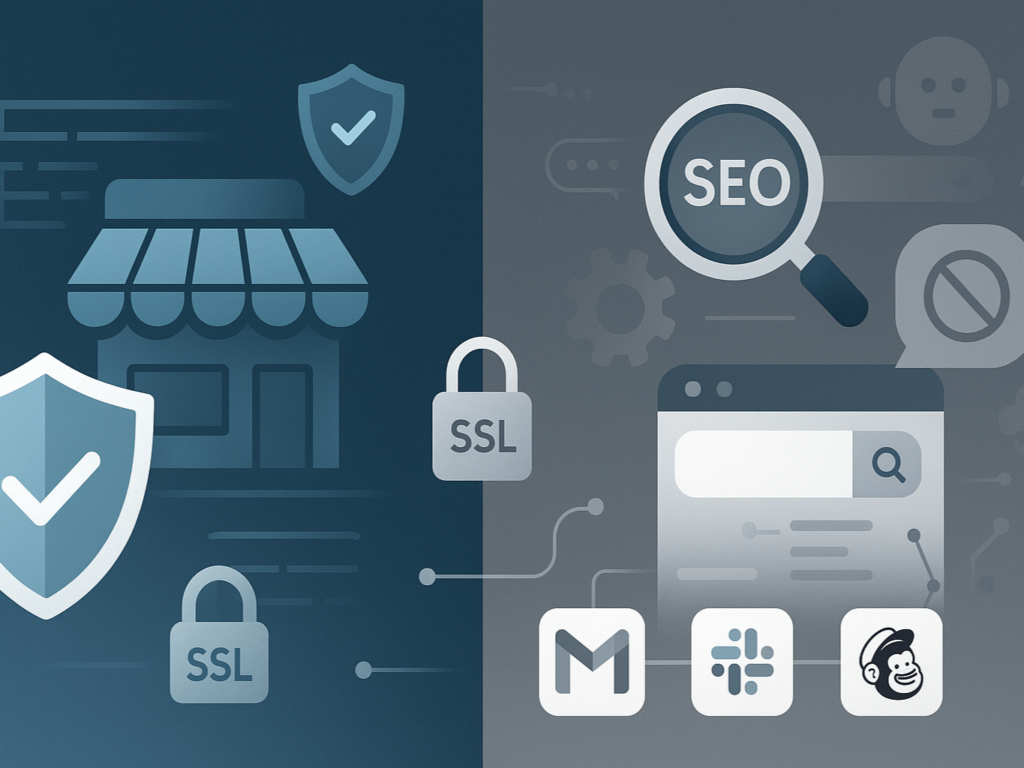
Examining Volusion’s security history reveals vulnerabilities alongside basic protections for your online store. The platform’s toolset encompasses essential SEO capabilities but falls short in content marketing options, posing challenges for long-term growth.
1. Security Features and Past Breaches
In September 2019, Volusion experienced a significant security breach when hackers compromised their Google Cloud infrastructure. The attackers injected malicious JavaScript code that captured customer payment information during checkout. According to BSSCommerce, by October 2019, approximately 239,000 credit card records had been stolen and sold on the dark web, affecting 6,589 stores. The total damages from this data breach reached roughly $133.89 million.
Currently, Volusion offers standard security features: PCI DSS Level 1 compliance, AES-256 encryption for sensitive data, and TLS v1.2 for secure transfers. Every store includes a 256-bit SSL certificate, a web application firewall, and intrusion prevention systems to block threats.
2. SEO Tools and Blogging Limitations
Volusion provides basic SEO tools for improving search visibility. You can optimize each page by adding meta titles, descriptions, and keywords. For those familiar with coding, HTML customization options allow further meta-tag refinement.
Yet, a critical weakness emerges with the complete absence of blogging functionality. This limitation hampers content marketing efforts, making it harder to attract potential customers through published content. The platform primarily sells physical products, with digital goods requiring a special setup.
3. App Integrations and Zapier Support
Volusion’s marketplace contains approximately 80 apps, which is considerably smaller than competitors like Shopify. Fortunately, Zapier integration extends this ecosystem substantially, connecting your store to over 1,000 additional applications without coding. This automation tool links Volusion with popular services, including Gmail, Slack, and MailChimp.
4. Is Volusion Ready for 2025 and AI Trends?
As eCommerce evolves, Volusion lags behind competitors in adopting AI technologies. While platforms like Shopify and Wix now offer AI-powered product recommendations, automated marketing, and intelligent chatbots, Volusion hasn’t incorporated these advanced features. The platform still provides basic automation through Zapier integration, helping with data syncing and workflow streamlining, yet without true AI capabilities.
Volusion Review: Strengths and Limitations
Here are Volusion’s strengths and limitations. It offers strong inventory tools, no transaction fees, and built-in marketing features. However, it lacks blogging, digital product support, and design limits, making it better suited for basic eCommerce needs.
| Strengths | Detail | Limitations | Detail |
| User-Friendly Interface | Simple dashboard and drag-and-drop tools for easy store setup. | Limited Design Flexibility | Customization is basic; it lacks deep design freedom. |
| Zero Transaction Fees | No fees on transactions across all plans. | No Built-in Blogging | No native blogging feature makes content marketing harder. |
| Advanced Inventory Tools | Unlimited product options, video support, and related products. | No Digital Product Support | You can’t sell downloadable products like ebooks or software. |
| SEO & Marketing Tools | Meta tags, custom URLs, and email marketing are built in. | Sales Volume Limits | Plans have annual sales caps that you must upgrade if you exceed. |
| Mobile App | Manage orders, inventory, and products on mobile devices. | Extra Costs for Premium Features | Premium templates and add-ons may cost more. |
| Secure Checkout | PCI-compliant, secure checkout system protects user data. | Slower Load Speeds | Users report slower page loading compared to other platforms. |
| 24/7 Customer Support | Live chat, phone, and email support are available at any time. | Limited App Integrations | Small app marketplace limits feature expansion. |
| Multi-Channel Selling | Sell on Amazon and eBay (with higher plans). |
Top Volusion Alternatives and Competitors 2025
In 2025, businesses seeking reliable eCommerce platforms can choose from strong Volusion alternatives like Shopify, Squarespace, WooCommerce, Wix, and BigCommerce. Each offers unique features, pricing, and scalability to fit different needs and growth ambitions.
| Feature / Platform | Shopify | Squarespace | WooCommerce | Wix | BigCommerce |
| Pricing Model | Tiered, no sales caps | Simple, no sales caps | Free core + paid hosting/plugins | Tiered, no sales caps | Tiered, no sales caps |
| Ease of Use | Beginner-friendly | Very beginner-friendly | Requires WordPress knowledge | Very beginner-friendly | Moderate, user-friendly |
| Templates & Design | 6,000+ themes, customizable | Award-winning, stylish | Highly customizable | 900+ designer templates | Professional, flexible |
| Sales Limits | None | None | None | None | None |
| Blogging Support | Built-in | Built-in | Full WordPress integration | Built-in | Built-in |
| App / Plugin Market | 6,000+ apps | Limited | Thousands of plugins | Moderate app market | Rich app marketplace |
| Multi-Channel Selling | Yes | Limited | Depends on plugins | Limited | Yes |
1. Shopify: Best for Modern, Scalable Stores
(i) Why Choose Shopify Over Volusion
Shopify outshines Volusion with its modern templates, intuitive UI, and rich app ecosystem. It supports unlimited products (physical and digital), has no sales caps, and offers powerful SEO and blogging tools. For scaling brands, Shopify is more future-ready.
(ii) What Makes It Stand Out
Volusion limits your growth with rigid pricing tiers and outdated features. In the battle of Volusion vs Shopify, Shopify clearly leads. Its flexibility, scalable plans, reliable hosting, and built-in marketing tools make it the preferred platform for serious eCommerce entrepreneurs at every level.
Top Features:
- Unlimited products (physical + digital)
- Built-in blogging for SEO
- 6,000+ app integrations
- AI-powered storefront tools
- Drag-and-drop theme editor
- Mobile-optimized templates
Ideal For:
Shopify is best for brands that want to scale fast, create content-rich stores, and build strong multichannel selling strategies. From solopreneurs to large businesses, it adapts to you.
Real-World Rating:
- ⭐4.4/5 on G2 (based on 4,500+ reviews)
- ⭐4.5/5 on Capterra (based on 6585+ reviews)
- ⭐1.3/5 on Trustpilot (based on 3400+ reviews)
If you need a sleek, scalable, and content-ready platform, Shopify is hands-down the more innovative Volusion alternative in 2025.
2. Squarespace: Best for Design-Driven Online Stores
(i) Why Choose Squarespace Over Volusion
Squarespace beats Volusion in aesthetics, content marketing, and ease of use. It supports blogging and digital product sales and does not have forced upgrades based on sales volume. For creative entrepreneurs, Squarespace offers a cleaner, more elegant store experience.
(ii) What Makes It Stand Out
Unlike Volusion’s outdated templates and missing features, Squarespace provides visually stunning designs, an intuitive drag-and-drop builder, and built-in SEO. It’s ideal for brands that care about visual identity, storytelling, and content-rich commerce without needing any code or developer support.
Top Features:
- Award-winning, mobile-friendly templates
- Built-in blogging and SEO tools
- Sell physical, digital, or service-based products.
- Powerful analytics dashboard
- Integrated email marketing
- No sales volume limits
Ideal For:
Squarespace is perfect for creatives, boutique brands, artists, and small businesses who value branding and content as much as sales. It’s powerful for those who want a sleek storefront with minimal setup.
Real-World Rating:
- ⭐4.4/5 on G2 (based on 1,000+ reviews)
- ⭐4.6 on Capterra (based on 3318+ reviews)
- ⭐1.2/5 on Trustpilot (based on 1500+ reviews)
Suppose your brand relies on visuals, design, or storytelling, and Volusion feels clunky. In that case, Squarespace gives you the beauty and flexibility to grow confidently.
3. WooCommerce: Best for Fully Customizable WordPress Stores
(i) Why Choose WooCommerce Over Volusion
WooCommerce offers unmatched flexibility because it’s built on WordPress, letting you customize every aspect of your store. Unlike Volusion’s limited templates and features, WooCommerce supports digital and physical products, unlimited sales, and a massive plugin ecosystem to scale your Business.
(ii) What Makes It Stand Out
While Volusion restricts growth and lacks blogging, WooCommerce combines full content marketing power with eCommerce. Its open-source nature means you control hosting, design, and functionality, making it ideal for tech-savvy users who want total store ownership.
Top Features:
- Complete WordPress integration with full blogging support
- Unlimited products and no sales caps
- Thousands of free and paid plugins
- Customizable themes and checkout options
- Supports digital, physical, and subscription products
- Strong SEO capabilities
Ideal For:
WooCommerce is perfect for businesses that want complete control and customization. Suppose you’re comfortable with WordPress or want a highly scalable store with rich content marketing. In that case, WooCommerce is an excellent Volusion alternative.
Real-World Rating:
- ⭐4.5/5 on G2 (based on 2,300+ reviews)
- ⭐4.5/5 on Capterra (based on 1008+ reviews)
- ⭐1.8/5 on Trustpilot (based on 111+ reviews)
For those who want total control, scalability, and content integration, WooCommerce beats Volusion hands down, especially if you already use WordPress.
4. Wix: The All-in-One Website Builder
(i) Why Choose Wix Over Volusion
Wix offers an all-in-one, beginner-friendly platform with a simple drag-and-drop builder, unlike Volusion’s clunky interface. It supports blogging, unlimited products, and no forced sales upgrades, making it ideal for small businesses and creatives seeking an easy setup without technical hassle.
(ii) What Makes It Stand Out
Volusion’s limitations on templates and features are outmatched by Wix’s vast design options and flexible e-commerce tools. Wix also offers integrated marketing features and robust SEO capabilities, helping merchants grow their stores with minimal effort.
Top Features:
- 900+ designer-made templates
- Drag-and-drop website builder
- Built-in blogging and SEO tools
- Unlimited products with no sales caps
- Integrated email marketing and social tools
- Mobile-optimized and fast-loading
Ideal For:
Wix is perfect for beginners, creatives, and small businesses wanting a quick, visually appealing store without complex setups. It’s great for users who wish to handle all their website needs on one platform.
Real-World Rating:
- ⭐4.3/5 on G2 (based on 1,200+ reviews)
- ⭐4.4/5 on Capterra (based on 10389+ reviews)
- ⭐4.3/5 on Trustpilot (based on 24000+ reviews)
Suppose you want an easy, all-in-one platform with beautiful designs and no hidden sales limits. In that case, Wix is a strong Volusion alternative for 2025.
5. BigCommerce: Best for Growing and Enterprise Stores
(i) Why Choose BigCommerce Over Volusion
BigCommerce offers robust scalability and built-in features without forcing sales-based pricing jumps like Volusion. It supports unlimited products, advanced SEO, and multichannel selling, making it ideal for businesses ready to grow beyond entry-level platforms.
(ii) What Makes It Stand Out
Volusion limits growth with annual sales caps and outdated templates. BigCommerce delivers powerful native tools, a rich app marketplace, and extensive customization without sacrificing ease of use, perfect for ambitious merchants targeting rapid expansion.
Top Features:
- Unlimited products and bandwidth
- Built-in SEO and marketing tools
- Multichannel sales (Amazon, eBay, social media)
- Advanced shipping and payment options
- Flexible APIs and integrations
- No sales volume-based pricing tiers
Ideal For:
BigCommerce suits mid-sized to large businesses that need robust features and growth potential without sudden pricing surprises. It’s perfect for merchants focused on scaling quickly and selling across multiple channels.
Real-World Rating:
- ⭐4.4/5 on G2 (based on 2,000+ reviews)
- ⭐4.4/5 on Capterra (based on 329+ reviews)
- ⭐1.5/5 on Trustpilot (based on 437+ reviews)
BigCommerce is a top-tier Volusion alternative in 2025 for fast-growing businesses seeking powerful features without sales caps.
Conclusion: Volusion ecommerce review
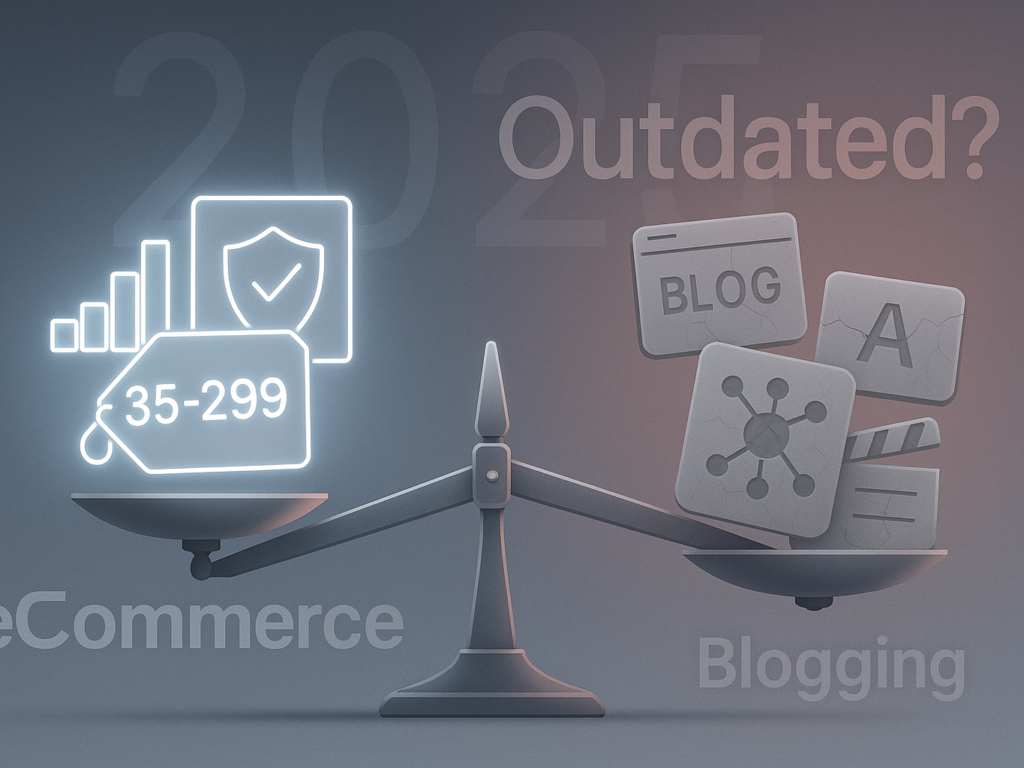
Volusion presents a complex profile in 2025. Despite over 20 years in the eCommerce space, this Volusion eCommerce review reveals concerns about its long-term viability. A 17% drop in active stores and a 2020 bankruptcy filing cast doubt, despite the platform offering essential inventory and marketing tools.
The pricing looks affordable initially, but hidden limits on annual sales can trigger forced upgrades, unexpectedly turning $35 into $299. Volusion’s lack of support for digital products and absence of blogging severely restricts long-term content strategy. Even with secure checkout and mobile access, Volusion falls behind in modern flexibility.
Volusion struggles to meet the evolving demands of today’s online sellers. Its limited app marketplace, lack of AI features, and outdated templates make it feel dated. It might suit tiny businesses, but better alternatives are more future-proof and growth-friendly for anyone serious about scaling, visibility, or innovation.
FAQs on volusion review
Q: What happens when I exceed Volusion’s annual sales limits?
Volusion automatically upgrades your account to the next pricing tier without consent. This can instantly increase monthly costs from $35 to $299, making budgeting unpredictable for growing businesses.
Q: Does Volusion support blogging for content marketing?
Volusion lacks blogging functionality, severely limiting SEO and content marketing strategies. This absence makes it difficult to attract organic traffic and build long-term customer relationships.
Q: Is Volusion secure after the 2019 data breach?
While Volusion now offers PCI compliance and encryption, the 2019 breach compromised 239,000 credit cards. Current security measures exist, but past vulnerabilities raise ongoing trust concerns.
Q: Can I sell digital products like ebooks on Volusion?
Volusion doesn’t natively support digital product sales. You’ll need a special setup or third-party solutions to sell downloadable items, making it unsuitable for digital entrepreneurs and content creators.


